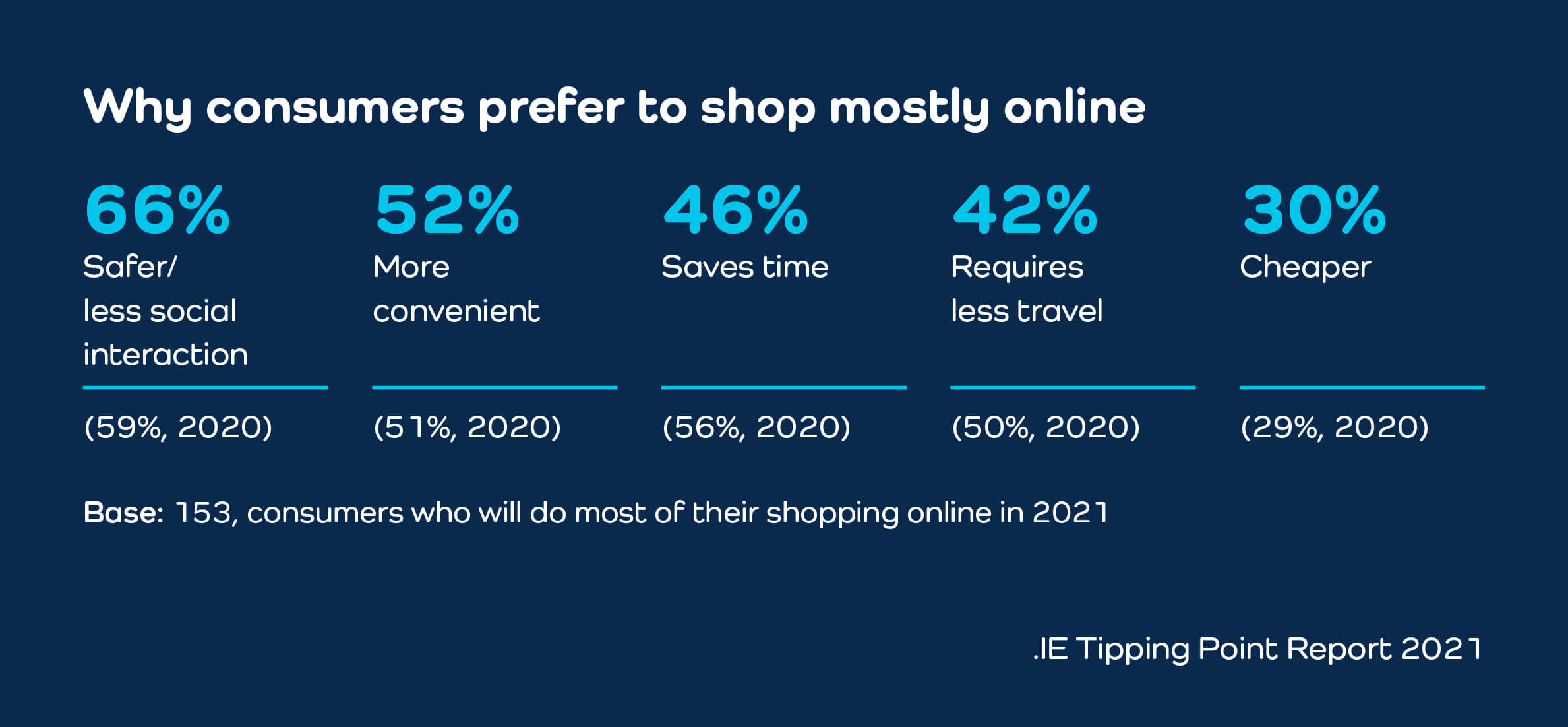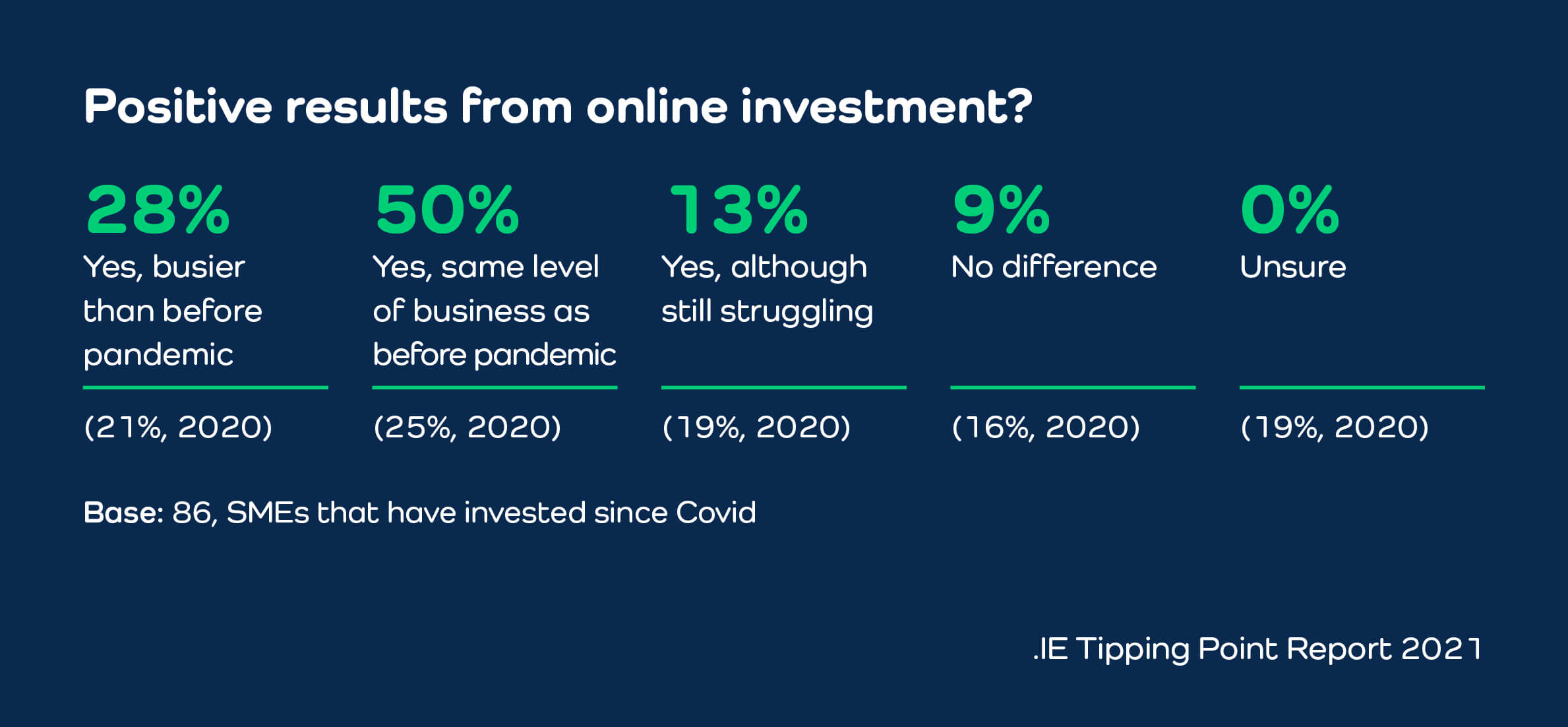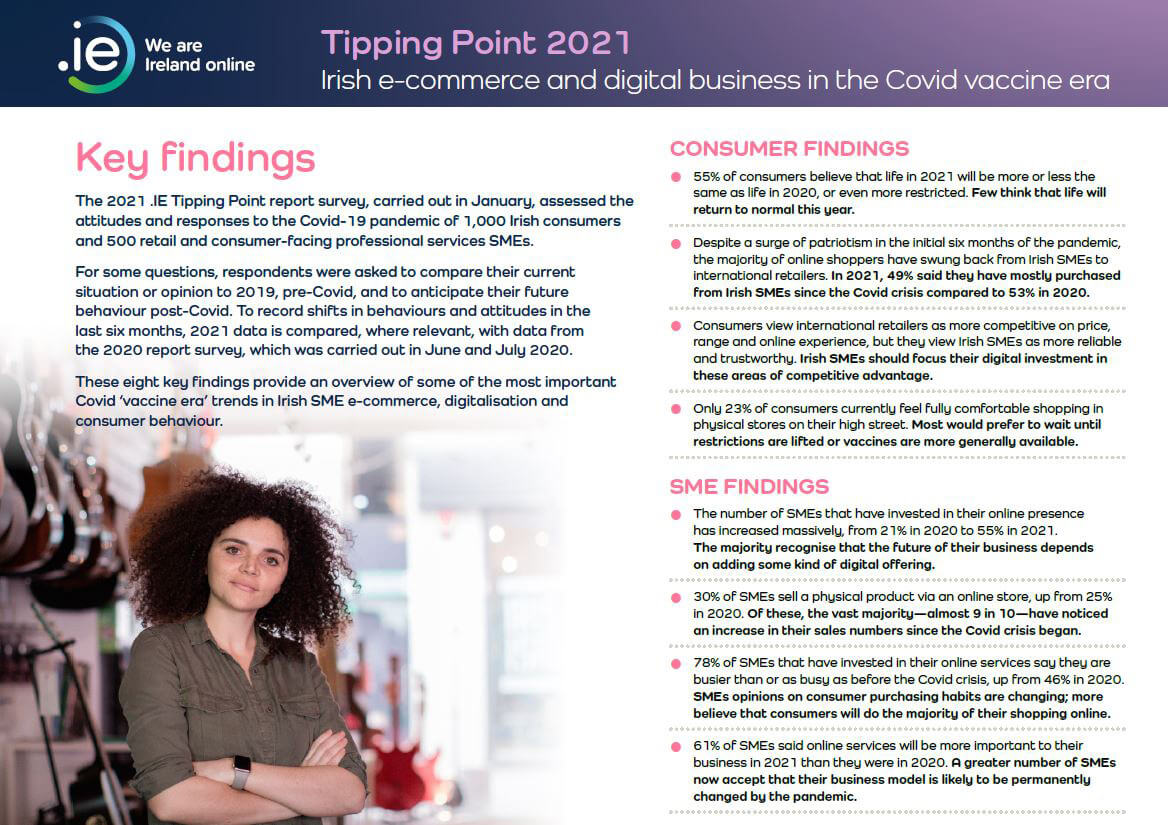The number of SMEs that have invested in their online presence has increased massively, from 21% in 2020 to 55% in 2021 according to a new research report published today by .IE, in partnership with Digital Business Ireland. Of these companies, 78% say they are busier than – or as busy as – before the Covid crisis. That’s an increase from 46% in 2020.
Meanwhile, nearly three-quarters (71%) of consumers say they will not feel comfortable shopping on their local high street until a number of conditions are met. These include a decrease in the number of Covid cases, a greater availability of vaccinces, and a declaration that masks and social distancing are no longer required.
While some are hopeful that we will reach this stage by the end of the year, 55% of those surveyed believe that life in 2021 will be more or less the same as in 2020.
The 2021 .IE Tipping Point report, ‘Irish e-commerce and digital business in the Covid vaccine era’, is the second in a series of reports analysing consumer and SME behaviour and attitudes since the pandemic. It was commissioned by .IE, the national domain name registry, in partnership with Digital Business Ireland, and carried out by Core Research.
Research was carried out from 11–27 January 2021. A total of 1,000 consumers aged 18+ were surveyed via online questionnaire. A total of 500 SMEs in the retail and customer-facing professional services sectors were interviewed via telephone.
The Covid consumer
68% of consumers reported spending more online in 2020 than they did in 2019. Looking ahead, 58% will prioritise online shopping over in-store shopping in 2021, up from 52% last year. 42% of consumers said they will do most of their shopping in bricks-and-mortar stores this year, down from 48% in 2020.
Among consumers who say they will do most of their shopping in physical stores in 2021, 61% said it is more convenient. 39% said they will shop mostly in physical stores because it is a chance for social interaction and to go outside; interestingly, this figure has dropped from 55% in 2020, presumably as cases have increased since Christmas.
For those consumers who said they would do most of their shopping online, social interaction had the exact opposite effect: 66% said shopping online is safer and means less social interaction. 52% say it is more convenient and 46% say it saves them time.
The 2020 .IE Tipping Point report, published last summer, showed that 53% of consumers reported doing the majority of their online shopping with Irish SMEs since the start of the pandemic, compared to 47% from international retailers. The 2021 report shows that this figure has now swung back to international retailers: 49% now say they have done the majority of their shopping with Irish SMEs since the start of the pandemic, 51% with international retailers.
“Irish consumers want to support local businesses through a difficult period, but SMEs can’t expect that goodwill to last forever. A stable, long-term e-commerce strategy cannot be built on crisis solidarity alone,” said .IE CEO David Curtin. “Irish SMEs have a number of unique, competitive advantages that consumers recognise and value, namely trustworthiness, reliability, and delivery speed. SMEs need to focus on these factors, on honing the customer experience online and off, rather than trying to undercut overseas retailers on price and range.”
The Covid SME
Almost a third (30%) of SMEs now claim to sell a product online in some way (either through a website or third-party platform), up from 25% in 2020. Almost 9 in 10 of that group say they have noticed an increase in their online sales numbers since the Covid pandemic began.
The number of SMEs that have invested in their online presence has increased dramatically since last year. Now more than half (55%, up from 21% in 2020) claim to have spent money on improving their digital platforms, with most either launching or improving their website. 78% of SMEs say that they are busier than or as busy as before the pandemic because of their online investment, up from 46% in 2020.
61% of SMEs say their online services will be more important to their business in 2021 than they were in 2020, and 79% will continue to invest in them this year. It is clear that a greater number of Irish businesses accept that their business model is likely to be permanently changed by the pandemic.
Lorraine Higgins, Secretary General of Digital Business Ireland, a .IE Tipping Point report partner, said: “Unquestionably, the future of business is ‘omni-channel’, with a physical and digital footprint. It is important to stress that these concepts are not mutually exclusive; what’s bad for one permeates the other. Therefore, adequate policy responses are needed to ensure a robust shopping landscape where online and bricks-and-mortar co-exist.”
Six Key Insights from the 2021 Tipping Point Report
‘Buying Irish’ isn’t enough
In this edition of the .IE Tipping Point report, more consumers who reported doing the majority of their online shopping with Irish SMEs said they did so out of a desire to help local businesses through the pandemic. However, overall online spend has actually swung away from Ireland and back to international retailers. Crisis solidarity is not enough for a stable e-commerce strategy. Irish SMEs seeking to sustain their business through their online store can only retain their customers in the long term by consistently improving the online customer experience.
Play to your strengths
Irish SMEs have competitive Unique Selling Points (USPs) in the battle against multinationals, such as trust and reliability. They need to focus on perfecting these advantages – for example, with personalised
customer communications or faster delivery services – so that shopping local continuously generates benefits and value-adds for their customers.
Brexit: advantage Ireland?
While Irish SMEs no doubt prefer that Brexit had not happened, the UK’s withdrawal from the EU may actually confer local businesses with some advantages. SMEs should seek to exploit them and inform their customers wherever possible.
Omni-channel is preferred
Consumers are spending more online and intend to keep doing so after the pandemic. Their in-store shopping routines have changed over the last year, and many now favour visiting shops at a certain time of the week, when they view them as safer or less crowded. If this behaviour becomes more apparent, bricks-and-mortar SMEs that have invested in an online store since lockdown will have a major advantage over
their offline competitors after the pandemic.
Virtual service delivery
Irish online service providers have am obvious advantage here over their overseas counterparts. However, services are still purchased only infrequently online by consumers. This may be because many Irish SMEs and professional services firms have not yet invested in the tools or methods required to make the consumer experience useful and seamless. Service providers should assess their use and deployment of technology, and whether it is fit for purpose.
There is no way back
The pandemic is a continuum, not a standalone event. Shifts in consumer and SME behaviour are still occurring. What we view as Ireland’s digitalisation tipping point may be an downward spiral for those who fail to adapt as e-commerce and online interaction become the default.
The .IE Tipping Point Report 2021 is available to download here.









